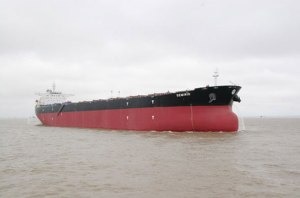What does ‘S&P’ stand for in the shipping industry? It definitely doesn’t stand for Standard & Poor’s, although a few shipping companies have been aspiring to be part of the well-respected ‘S&P 500’ index. It doesn’t stand for ‘Salt and Pepper’, although sailors and the Navy are dressed seasonally in Summer Blue (“Salt and Pepper”.) It doesn’t stand for Shipping & Processing, even evocatively, although we are still talking about the shipping industry. It doesn’t stand for Standards & Practices applied in the broadcasting industry, Standards and Protocols or Security and Privacy used in the computer science, Sensation and Perception in psychology, Subcontract and Procurement in workflow analysis, or Strategy and Policy used in consulting and business analysis.
It simply stands for Sale & Purchase (S&P), the business practice of buying and selling commercial ships in the open market. As grandiose ships as they may look, there is a need for their brokerage, whether as newbuilding contracts to be ordered at the shipbuilders when they first are getting built, or as ‘used’ vessels in the secondary market, or finally as old vessels now are destined sale for scrapping (demolition.) The professionals who are brokering the vessels are called ship brokers (or S&P brokers,) and are offering different services from charter brokers (who are brokering the freight / employment for the vessels but not the vessels themselves; brokers focusing on the tanker market are called tanker brokers.)
S&P brokers, much like real estate agents, do not hold any inventory on their balance sheets, that is that they do not own the vessels they sell; they just sell other people’s vessels to buyers without actually undertaking any risk at all (besides the time and effort they put into a transaction) or making any capital commitment in the transaction. As such, the barriers to enter the industry are relatively low, and when times are good, there are many entrants, a great deal of which will wash out during the next market trough. As great as this may be for most of the time for the principals (shipowners) looking to buy or sell vessels, since brokers usually provide liquidity, efficiency and, yes, more transparency than otherwise in the market, it’s not always an accretive situation for the market and its interests; low barriers mean that jetsam and flotsam enters and leaves the market depending on whether quick buck can be made without necessarily contributing value to the market.
S&P brokers may specialize in certain market segments by asset class such as dry bulk vessels or containerships or tankers, of gas carriers, etc; they may specialize in certain geographic markets dealing with clients or types of vessels in certain ‘contained’ markets such as vessels in the cabotage business or customized vessels for a certain trade such as mini-bulkers or shallow draft vessels, etc; ship brokers may also specialize by function such as focus on newbuilding vessels or scrap brokers – there are distinct intricacies dealing with a newbuilding contract to a shipbuilding yard where financing and technical details for a vessel expected to be market competitive for the next twenty-five years are extremely vs. selling a vessel by the pound (actually by lightship deadweight tonnage (ldt)) for her last voyage of no return to the scrap pile. There are specialist ship brokers who have been working with clients lacking shipping market expertise, such as leasing companies or equity investors or lenders, who have to depend on proven track-records of solid experience and dedication at accessing not only top notch ship brokerage services but also hands-on expertise and logistical support (since unlike an operating shipowner cannot depend on in-house expertise.) Finally, ship brokers can be ‘competitive’ brokers offering their services to any potential buyer or seller, while there are also ‘in-house’ brokers who work exclusive for a ship owner (usually larger or active shipowners who trade fairly often and need in-house, dedicated expertise which they can control.)
What are the services that ship brokers usually offer in their regular course of their business? The short, sweet answer is that they ‘broker ships’ between buyers and sellers and make a commission from the sale; that’s life and destiny for most of the ship brokers and fulfillment of many dreams. The degree of competence and success increases exponentially with access to market information in general, and information about the vessels themselves, their owners, the circumstances of the transaction, their skill and dedication to negotiate great price for their client (above-market-level price for a seller, below-market-level price for a buyer), and can follow up the documentation and closing of the transaction in a professional and competent level.
Ship brokerage, is a great and value-added service to the maritime industry. Selecting a ship broker to do business with is more complicated, but often, one of the most rewarding professional relationships that can be built! A great deal of shipowners started out as shipbrokers. And another great deal of shipowners make fortunes based on the dedicate work and advise of their brokers…
© 2013 Basil M Karatzas & Karatzas Marine Advisors & Co.
No part of this blog can be reproduced by any means and under any circumstances, whatsoever, in whole or in part, without proper attribution or the consent of the copyright and trademark holders.


What is a likely website or broker where one might see older freighters and / or whalers which might be destined for scrap, but which could be rehabbed for use in pacific garbage pick-up and removal project? Thanks.